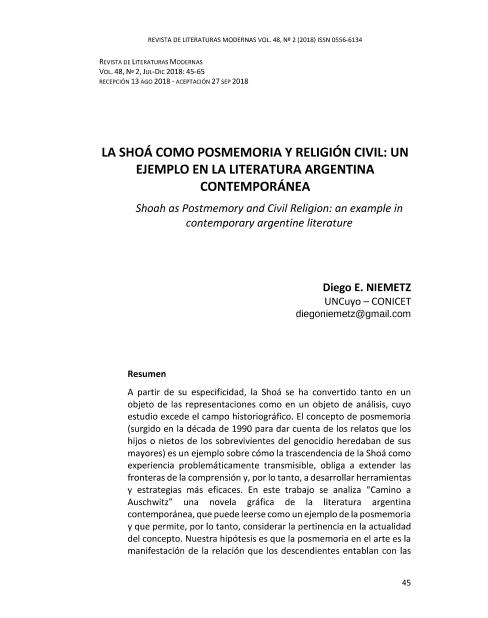Mostrar el registro sencillo del ítem
dc.contributor.author
Niemetz, Diego

dc.date.available
2022-10-31T20:06:48Z
dc.date.issued
2019-07
dc.identifier.citation
Niemetz, Diego; La Shoá como posmemoria y religión civil: un ejemplo en la literatura argentina contemporánea; Universidad Nacional de Cuyo. Facultad de Filosofía y Letras. Instituto Literaturas Modernas; Revista de Literaturas Modernas; 48; 2; 7-2019; 45-65
dc.identifier.issn
0556-6134
dc.identifier.uri
http://hdl.handle.net/11336/175702
dc.description.abstract
A partir de su especificidad, la Shoá se ha convertido tanto en un objeto de las representaciones como en un objeto de análisis, cuyo estudio excede el campo historiográfico. El concepto de posmemoria (surgido en la década de 1990 para dar cuenta de los relatos que los hijos o nietos de los sobrevivientes del genocidio heredaban de sus mayores) es un ejemplo sobre cómo la trascendencia de la Shoá como experiencia problemáticamente transmisible, obliga a extender las fronteras de la comprensión y, por lo tanto, a desarrollar herramientas y estrategias más eficaces. En este trabajo se analiza "Camino a Auschwitz" una novela gráfica de la literatura argentina contemporánea, que puede leerse como un ejemplo de la posmemoria y que permite, por lo tanto, considerar la pertinencia en la actualidad del concepto. Nuestra hipótesis es que la posmemoria en el arte es la manifestación de la relación que los descendientes entablan con las historias heredadas y que, al mismo tiempo, reflejan la pervivencia, en las vidas de los descendientes, del trauma masivo ocasionado por la maquinaria nazi.
dc.description.abstract
From its specificity, the Shoah has become both an object of representations and an object of analysis, whose study exceeds the historiographical field. The concept of postmemory (emerged in the 1990s to name the stories that the children or grandchildren of genocide survivors inherited from their elders) is an example on how the Shoah, as a problematically transmissible experience, forces to extend the frontiers of understanding and, therefore, to develop more effective tools and strategies. In this paper we analyze "Camino a Auschwitz", a graphic novel of contemporary Argentine literature, which can be read as an example of postmemory and which allows, therefore, to consider the relevance of the concept at the present time. Our hypothesis is that postmemory in art is the manifestation of the relationship between the descendants and the inherited stories. At the same time, these stories, reflect the persistence, in the lives of the descendants, of the massive trauma caused by the Nazi machinery.
dc.format
application/pdf
dc.language.iso
spa
dc.publisher
Universidad Nacional de Cuyo. Facultad de Filosofía y Letras. Instituto Literaturas Modernas
dc.rights
info:eu-repo/semantics/openAccess
dc.rights.uri
https://creativecommons.org/licenses/by-nc-sa/2.5/ar/
dc.subject
POSMEMORIA
dc.subject
LITERATURA ARGENTINA CONTEMPORÁNEA
dc.subject
CAMINO A AUSCHWITZ
dc.subject.classification
Literaturas Específicas

dc.subject.classification
Lengua y Literatura

dc.subject.classification
HUMANIDADES

dc.title
La Shoá como posmemoria y religión civil: un ejemplo en la literatura argentina contemporánea
dc.title
Shoah as postmemory and civil religion: an example in contemporary Argentine literature
dc.type
info:eu-repo/semantics/article
dc.type
info:ar-repo/semantics/artículo
dc.type
info:eu-repo/semantics/publishedVersion
dc.date.updated
2022-10-25T14:42:54Z
dc.journal.volume
48
dc.journal.number
2
dc.journal.pagination
45-65
dc.journal.pais
Argentina

dc.journal.ciudad
Mendoza
dc.description.fil
Fil: Niemetz, Diego. Consejo Nacional de Investigaciones Científicas y Técnicas. Centro Científico Tecnológico Conicet - Mendoza; Argentina. Universidad Nacional de Cuyo. Facultad de Filosofía y Letras; Argentina
dc.journal.title
Revista de Literaturas Modernas
dc.relation.alternativeid
info:eu-repo/semantics/altIdentifier/url/https://revistas.uncu.edu.ar/ojs/index.php/literaturasmodernas/article/view/2018
Archivos asociados
